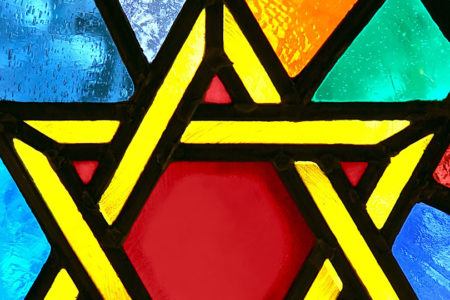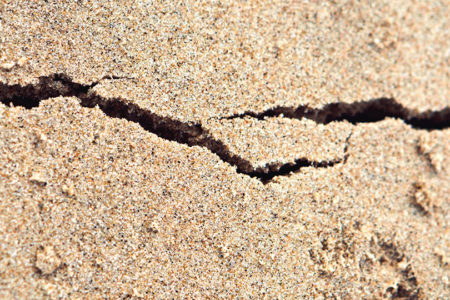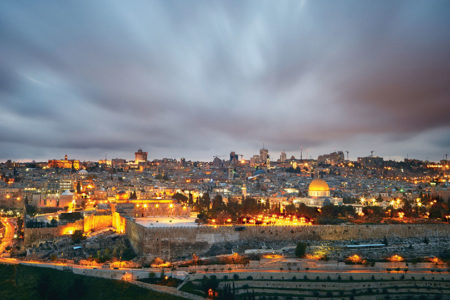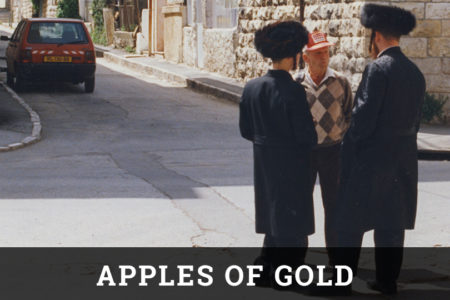Israel in the News Feb/Mar 1991
Rising fundamentalist Islam signals danger for Jordan’s King Hussein
From our correspondent in Israel
Following a foiled attempt to infiltrate Israel by three Jordanian police officers and one civilian, Israel is looking closely at the stability of King Hussein’s regime in Jordan. Israeli military leaders have continually expressed concern about the growing voice of Muslim fundamentalist groups in the Hussein government and the number of attacks across the border by “civilian and military activists.”
The suspicion over the king’s “loosened grip” over the fundamentalist groups was confirmed when the Muslim Brotherhood recently won an unprecedented victory by electing Abdul Latif Arabiyat to the position of Speaker of the House of Parliament over the close ally of the king, Sulieman Arar. He was elected by the wide margin of 41 to 28 over the incumbent.
Although the new speaker is considered to be a more moderate voice within his party, Israel’s Prime Minister responded with concern over the advance of such extremist parties in Jordan. Referring to the “wave of fanatical hysteria,” Prime Minister Shamir said, “There is no guarantee that Hussein will be strong enough to overcome it [rising fundamentalism.]”
Education Ministry reeling from statistical reports on new Soviet immigration to Israel
From our correspondent in Israel
The new reports released on Soviet immigration reveal that Israel is absorbing an average of nearly 200 new students per day this school year into the national school system. New students have put a strain on the Education Ministry’s already ailing budget.
Many Israeli children in kindergarten-type gan programs around the country were cut back to a five-day (Sunday to Thursday) school week, down from last year’s six-day (Sabbath off) program. The reduction in class hours was to compensate for the financial needs, and yet the cost of the five days was more than the six days last year.
Public language classes (ulpans) are also experiencing difficulties keeping up with the new wave of immigrants. Last month, more than 50,000 people were attending Hebrew language courses in the country, up from about 4,000 during the same period two years ago. The cost of this is subsidized heavily by the government, but these subsidies are more and more limited as Israel finds itself having to tighten the budget belt.
“New Deal” sounds like “Bad Deal”
From our correspondent in Israel
Israel’s Prime Minister Shamir added recently to the strength of his coalition government by making an agreement with the ultra-orthodox Agudat Yisrael party to join the coalition. The Prime Minister, apparently trying to make his government less susceptible to the threats of smaller parties in the coalition who constantly promise to leave when they aren’t happy, increased the party’s majority to 66 of the 120 Knesset (Parliament) seats.
The new partnership has drawn sharp criticism from many sides, as the deal highlights one of the deep divisions in Israeli society. The ultra-orthodox parties, including the National Religious Party and the Agudah, represent only a small fraction of Israeli viewpoint. Many Israelis have little or no connection to their Jewish faith and are not happy that this small segment of the population has so much power in the political arena.
An example of the tension are the concessions made to Agudah to get them to join the coalition. The party demanded that three measures be adopted before the four new ministers of the Knesset would take their new positions. The first was the “pork law,” making it illegal to raise pigs or process pork in Israel (with the exception of a few small Arab villages). This would cripple the economy of several kibbutzim that process pork for secular “non-Kosher” Israelis. The second was the “Sabbath transportation measure,” which called on Israel to stop desecrating the Sabbath by allowing some bus lines to operate. The third measure was the “decency law,” which will further tighten restrictions on the material displayed on public placards and billboards, in terms of modest deportment.
All of these concessions exacerbate the tensions between the secular and religious communities. Secular Israeli groups feel that the religious minority is imposing its views on the greater democratic Jewish society disproportionate to the size of their party following.
Nation at risk?
From the Associated Press
A booklet issued by the American Jewish Committee contends that a “new activism” by pro-Palestinians within Christian churches seeks to undermine sympathy for Israel and is putting Israel at risk.
Advocacy in the churches of Palestinian Arab political goals has taken an increasingly anti-Israel tilt “in that failure to achieve either peace or stability in the Middle East is laid almost entirely at Israel’s door,” the booklet says.
Called “Israel at Risk, the Campaign to Erode Christian Support,” the booklet says the anti-Israel campaign “projects a negative and hostile view of Israel’s motives, combined with a frequently uncritical endorsement of Palestinian claims.”
Anti-Semitic solidarity
From The Jerusalem Post
In the wake of the recent manifestations of anti-Semitism in Poland, the younger members of the minuscule Jewish community there are giving “serious consideration” to aliya (immigration of Jews from other countries to Israel). The elderly are afraid to stay but are also afraid to leave, as they cannot envisage starting anew—in Israel or anywhere else.
Priority for desalination
From The Jerusalem Post
With the water crisis in Israel worsening daily, the Energy Ministry announced last week that it would give high priority to desalination projects. The ministry, in conjunction with the Agriculture Ministry, has established a committee in the Israel Electric Corp. to study ways of advancing the subject.
European leaders take step to unity
From the Toronto Star
ROME—Twelve European leaders have reached an unprecedented agreement that will bring their elusive goal of a “United States of Europe” closer than ever to reality.
The agreement reached between the leaders of the European Community—Britain, France, Germany, Italy, Spain, and seven others—aims to develop a single European nation with its own form of money as fast as possible, and sooner than anyone thought likely only days ago.
Satanic rites on beach
From The Jerusalem Post
Satanic cults that gather at beaches to perform late-night animal sacrifices to the tune of ritual chants are attracting dozens of teenagers across the country, parents told the Knesset Education Committee recently.
“The phenomenon exists, even if only on a small scale, and it is dangerous,” said committee chairman Michael Bar-Zohar (Labor). He called on the police and Education Ministry to investigate the matter.
Rabbi calls for revived Sanhedrin
From The Christian World Report
Under the title, “Needed: Seventy Leaders,” Rabbi Shlomo Riskin, writing on Numbers 11, issued a call for a new Sanhedrin, the Jewish Council of Seventy Elders.
“Seventy elders must emerge as this generation’s leaders and teachers,” wrote Riskin. “It would be naive to expect these 70 to speak with one voice, but they must speak with one heart and soul, and they must rekindle our prophetic dream of peace and redemption.”
This call for a revived Sanhedrin is prophetically significant in relation to the coming restoration of Levitical worship in a new temple in Jerusalem.
Jews now setting dates for Messiah
From National & International Religious Report
A clash in the Persian Gulf will shake the world, and “then the Messiah will come and proclaim salvation is at hand.” Those are not the words of Hal Lindsey, but Lubavich Rabbi Menahem Schneerson of New York preaching to his ultra-orthodox followers.
He predicted that the cataclysmic confrontation that will lead to Messiah’s coming will occur before the end of this year. Schneerson is an influential figure among Israel’s ultra-orthodox community, which accounts for about 20% of the land’s Jewish population.
Arab village offers to absorb Jews
From The Jerusalem Post
Zaki Jubran has offered to absorb Soviet Immigrants in Jish, his small, predominantly Christian-Arab village near Safed.
The local council chairman said that his aim was to encourage coexistence and counter extremist trends among Jews and Arabs. Meetings between the two groups to talk about coexistence were insufficient; actions were needed, he said.








